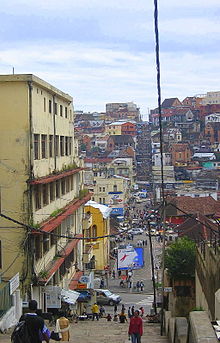This article has multiple issues. Please help improve it or discuss these issues on the talk page. (Learn how and when to remove these messages)
|
 The capital of Madagascar, Antananarivo | |
| Currency | Malagasy ariary (MGA) |
|---|---|
| Calendar year | |
Trade organisations | WTO, African Union |
Country group |
|
| Statistics | |
| Population | |
| GDP | |
GDP growth | |
GDP per capita | |
GDP by sector | services (60.3%), agriculture (23,7%), industry (16%) (2017 est.) |
| 7.8% (2017 est.) | |
| 42.6 medium (2012)[6] | |
Labour force | |
| Unemployment | |
Main industries | meat processing, soap, breweries, tanneries, sugar, textiles, glassware, cement, automobile manufacturing, paper, petroleum, tourism, |
| External | |
| Exports | $2.35 billion (2017 est.)[10] |
Export goods | coffee, vanilla, shellfish, sugar, cotton cloth, clothing, chromite, petroleum products |
Main export partners | |
| Imports | $3.235 billion (2017 est.)[10] |
Import goods | capital goods, consumer goods, food |
Main import partners | |
| Public finances | |
| USD $3.914 billion (2017 est.) | |
| Revenues | USD $1.292 billion |
| Expenses | USD $1.725 billion |
| Economic aid | recipient: $838 million (1997) |
All values, unless otherwise stated, are in US dollars. | |

The economy of Madagascar is US$9.769 billion by gross domestic product as of 2020, being a market economy and is supported by an agricultural industry and emerging tourism, textile and mining industries. Malagasy agriculture produces tropical staple crops such as rice and cassava, as well as cash crops such as vanilla and coffee.
Malagasy exports from customs protocol in some areas, notably the United States and the European Union. These exemptions have supported the growth of the Malagasy textile industry. Despite natural resources and developing industries, the 2009 Malagasy political crisis—considered by the international community to be an illegal coup[12]—deterred foreign investments in Madagascar and caused the Malagasy economy to decline.[13] Foreign investments have resumed following the resumption of elections in early 2014.[citation needed] Madagascar is a least developed country according to United Nations.
Madagascar's economy at 2024 is one of the fastest growing economies in the world[14][14].
- ^ "World Economic Outlook Database, April 2023". IMF.org. International Monetary Fund. Retrieved 23 May 2023.
- ^ "World Bank Country and Lending Groups". datahelpdesk.worldbank.org. World Bank. Retrieved 29 September 2019.
- ^ The World Factbook
- ^ a b c IMF
- ^ a b c d "World Economic Oulook April 2023 - Statistical Appendix Tables Part A - Table A4. Emerging Market and Developing Economies: Real GDP". International Monetary Fund. p. 147. Retrieved 5 December 2020.
- ^ "Gini index (World Bank estimate) - Madagascar | Data".
- ^ "Human Development Index (HDI)". hdr.undp.org. HDRO (Human Development Report Office) United Nations Development Programme. Retrieved 23 November 2022.
- ^ "Inequality-adjusted Human Development Index (IHDI)". hdr.undp.org. HDRO (Human Development Report Office) United Nations Development Programme. Retrieved 23 November 2022.
- ^ "Madagascar Unemployment rate - Economy".
- ^ a b "Madagascar Economy 2020, CIA World Factbook".
- ^ a b "Madagascar Economy 2023, CIA World Factbook". 3 April 2024.
- ^ "'SADC does not, cannot recognise Rajoelina'". Independent Online. Agence France-Presse. 19 March 2009.
- ^ Republic of Madagascar (3 June 2014). "Letter of Intent, Memorandum of Economic and Financial Policies, and Technical Memorandum of Understanding" (PDF). International Monetary Fund. p. 4. Retrieved 25 February 2015.
- ^ a b "Report for Selected Countries and Subjects". IMF.